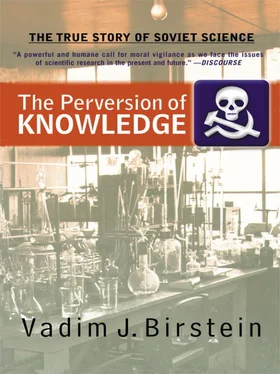Definitely, in the Soviet Union of the 1930s, the defense of arrested colleagues was regarded as a crime against the state. The warrant also allegedly connected Vavilov with Nikolai Bukharin and his followers. Bukharin was a proponent of gradual and peaceful involvement of peasantry in Soviet agricultural management through cooperative farms. He strongly opposed the Five Year Plan proclaimed by Stalin (and supported by Molotov) in 1929. Under this plan, peasants were forced to join Soviet cooperative farms (kolkhozes). During the process of collectivization, millions of peasants (and members of their families) were arrested and sent to labor camps. The collectivization also caused the famine of 1932–1933, during which about 12 million perished in the Ukraine and the Volga River region. 71For his opposition to collectivization, in November 1929 Bukharin was expelled from the Politburo and he and his followers were labeled “right-wingers.” 72
Several persons arrested in 1937 were forced to sign “testimonies” about the alleged Vavilov-Bukharin connection. The warrant cited the words of the deputy director of the VIR in charge of science, Arkadii Aleksandrov (1898–?), accused of being a member of a “right-wing” organization (which existed in the imagination of the NKVD investigators only), who testified on July 13–14, 1937: “[The arrested acting president of VASKhNIL] MURALOV and VAVILOV recommended that I should join their conspiracy and ordered me to contact some other members of the [anti-Soviet] organization within the VIR. Vavilov pointed to [I.] LAPIN and [Nikolai] KOVALEV.” 73
In the 1930s, A. K. Lapin headed the VIR Bureau on Experimental Studies. As for the agronomist Nikolai Kovalev (1888–1959), he directed the Nikitsky Botanical Garden from 1928 to 1930, then, from 1931–1936, he was deputy director of the VIR, and from 1936–1941, director of the VIR Experimental Station in the city of Maikop. Arkadii Aleksandrov died in imprisonment during the investigation of his case.
The former president of VASKhNIL, Academician Georgii Meister, who was arrested as an alleged member of a rightist-Trotskyist organization, supposedly also testified against Vavilov on October 19, 1937:
During meetings with the former participants of the “TKP,” Vavilov, Talanov, Shekhurdin, David, and Samarin, I repeatedly had anti-Soviet discussions with them, knowing that they continued to stand on the anti-Soviet position. All of them, as well as myself, became later members of a rightist-Trotskyist organization… 74
Like Vavilov, one of these scientists, the agronomist and VASKhNIL member Aleksei Shekhurdin (1886–1951), was an open anti-Lysenkoist. Together with two other prominent plant breeders, VASKhNIL academicians Pyotr Lisitsin and Pyotr Konstantinov, Shekhurdin declared in 1936 in public, at the Fourth Session of the VASKhNIL, that Lysenko’s agronomic methods had no value. 75It was not possible simply to dismiss the opinion of these scientists. For instance, in 1921, Lisitsin had drafted a decree “On Seed Production,” which was later signed by Lenin. The decree required that seed testing and production be performed at special scientific stations. 76In 1948, a few days before the August 1948 Session of VASKhNIL, Konstantinov sent a letter to Stalin criticizing Lysenko. 77
Academician Rudolf David (1887–1939), one of the founders of agricultural meteorology in the USSR and director of the Institute for the Study of Drought located in Saratov, who was mentioned by Meister, was arrested after he publicly defended Academician Nikolai Tulaikov, who had already been arrested. 78On November 27, 1937, he testified:
A large nucleus of prominent Academy [i.e., VASKhNIL] members, headed by VAVILOV, KOLTSOV [sic!], MEISTER, KONSTANTINOV, LISITSYN, and SEREBROVSKY [sic!], actively opposed Lysenko’s revolutionary theory of vernalization and intravarietal crossbreeding…. They were undoubtedly united in a single anti-Soviet organization… 79
It is known now that all these testimonies against Vavilov were signed only after torture. Academician Georgii Meister called Vavilov “a wrecker,” but later on he withdrew his charges. 80He lost his mind during the investigation, but the NKVD investigators still used his “testimonies.” However, Nikolai Gorbunov (permanent secretary academician before arrest) and Yakov Yakovlev, who, as commissar of agriculture, had frequently publicly criticized Vavilov and supported Lysenko, refused to testify against Vavilov during interrogations. 81
Molotov and Stalin had heard of Vavilov’s “Bukharin connection” before. On March 9, 1938, during the Bukharin trial, in a secret letter about the discussion of the trial among various groups of people (such information, based on reports from NKVD informers, was prepared for the Soviet leaders every few days), NKVD commissar Yezhov wrote: “Academician Vavilov N. I. in a conversation with the scientific staff of the VIR said: ‘N. I. Bukharin is a smart man, he has a wide vision; I traveled with him abroad. The trial is a long tale for small children.’” 82One can only guess which one of the VIR’s informers reported Vavilov’s words to the NKVD. Despite facts to the contrary, the accusation of connections with Bukharin stayed even in the verdict of the Vavilov case, dated July 5, 1941: “Following the orders from BUKHARIN, VAVILOV was engaged in a direct anti-Soviet connection with White Russian emigrants abroad and used his scientific trips abroad for this purpose.” 83
The NKVD warrant directly mentioned the names of Lysenko and Tsitsin, “elected” to the academy a year before Vavilov’s arrest:
Pushing forward hostile theories, VAVILOV is fighting against the theory and work of LYSENKO, TSITSIN, and MICHURIN, which have the crucial importance for agriculture in the USSR. He declares that “we were, are and will be the ‘anti’ [i.e., anti-Lysenkoists]; we will go to the fire for our [scientific] views and will not surrender our positions to anybody. It is not possible to give up the position. One must fight to the end.” 84
Definitely, the mentioning of Vavilov’s comparison of his situation to Galileo’s stand against the Inquisition in his arrest warrant—that is, “we will go to the fire for our views”—illustrates that the NKVD considered its role similar to that of the Inquisition. To arrest, torture, and execute opponents of scientists whose professional opinion was supported by the Party and the state was the OGPU/NKVD/NKGB method of solving professional disagreements in science. This phrase was taken, evidently, from the report of an informer and was cited in another document described below—the Memorandum.
On August 6, 1940, Vavilov was arrested by the NKVD while he was on an expedition in the Carpathians collecting plants. 85Thus, he was arrested before the warrant for his arrest was approved in Moscow by Beria (August 6) and Deputy General Prosecutor Safonov (August 7). In other words, an oral order to arrest Vavilov must have preceded the finalization of the NKVD paperwork in Moscow. The “Record of Personal Search of Nikolai Ivanovich Vavilov” has the same date. 86It is interesting that in the next “Record of the Search,” the date was changed to August 7. 87A devoted Lysenkoist, the agronomist Johann Eikhfeld replaced Vavilov as director of the VIR. In December 1940, Lysenko’s deputy, VASKhNIL vice president V. Mosolov, signed a decree excluding Vavilov from membership at VASKhNIL. 88
The same day, on August 7, 1940, the NKVD searched Vavilov’s apartments in Moscow and Leningrad, his country house (dacha), and his office in the VIR. 89The NKVD confiscated twenty-three items from his Moscow apartment. 90Included was a copy of a letter addressed to Stalin giving Vavilov’s scientific reasons for his disagreement with Lysenko (No. 3 on the list of confiscated items). No. 21 on the list was approximately 2,500 pages of Vavilov’s scientific manuscripts in nineteen folders. Forty-four items were confiscated from his Leningrad apartment. 91Item 38 mentioned twenty-twofolders of manuscripts and notes from various expeditions. On August 9, 1940, the search continued in Vavilov’s office. The list of the twenty-one confiscated items again contained many manuscripts (nineteen folders). 92
Читать дальше











